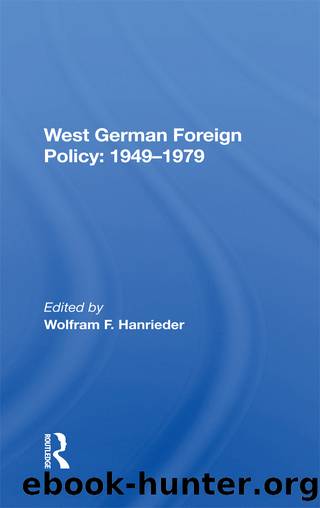West German Foreign Policy, 1949-1979 by Wolfram F Hanrieder

Author:Wolfram F Hanrieder [Hanrieder, Wolfram F]
Language: eng
Format: epub
ISBN: 9780367213374
Google: inpzzgEACAAJ
Goodreads: 58783631
Publisher: Routledge
Published: 2019-09-30T00:00:00+00:00
Strange Interlude
It is fairly clear that in the years that followed, Brandt and his associates devised an alternative Eastern policy, which was occasionally spelled out in startling terms by Egon Bahr. The Christian Democrats also recognized that there had to be alternatives to the frontal assault on the German national question. The Soviets could not be forced or charmed out of East Germany, but some Germans apparently thought that they might be maneuvered out. The remnants of the Adenauer period were gradually but purposefully dismantled, the Hallstein Doctrine being the most obvious. The road to Pankow seemed to lie through Bucharest, or so the theory ran.
Again we see the reoccurrence of the basic illusion: the assumption that if Soviet security interests could be satisfied in this way, their claim to East Germany could be softened. One must ask: if the Soviets maintained their German position in a period of major weakness, when the West had an atomic monopoly and massive strategic advantages, why would they relinquish it when their strategic position was improving in the 1960s, especially when their major adversary was entrapped in Southeast Asia?
The period between the Cuban crisis and the Czech crisis is an amorphous blur. Some of the major themes were recognizable, but the diplomatic maneuvering and exchanges elude a definitive analytical summary, In the West the view persisted that somehow a formula could be devised that would relieve Soviet apprehensions about its security; there were various ingenious semantic devicesârecognizing the status quo to change it; change through rapprochement; or various agreements on the nonuse of force. The idea was that the Soviet leaders would come to understand that the West did not really harbor any design on Eastern Europe and that a period of peaceful change could be inaugurated. This theme, which found resonance in Germany, became intertwined with the American obsession with nonproliferation. This, too, reflected the view that what was needed was to relieve Soviet apprehensions of a nuclear armed Germany The Soviet Union aided and abetted what amounted to the revival of "European security." In 1965-1967 the Soviets began to emphasize a European Security Conference, which would have as its starting point the dissolution of military blocs. As a subsidiary theme, there was a Soviet attempt to exclude the United States from participation. Doubtless this was a minor tactic to test how far the Vietnam war had gone in splitting the. United States from its allies, especially in the wake of Charles de Gaulle's withdrawal from the integrated commands of NATO. It was also a period in which American leadership in Europe was lacking because of the obsession with Vietnam. Gradually, without any particular strategy that was discernible, the West came to focus on the idea of a mutual reduction of forces, following vague Soviet hints in April 1967 that withdrawal of "foreign troops" might be an issue for exploration. The formal Western proposal of June 1968 suggested mutual reductions. The conclusions of the nonproliferation treaty shortly afterward stimulated speculation that a new era of peaceful engagement might be dawning.
Download
This site does not store any files on its server. We only index and link to content provided by other sites. Please contact the content providers to delete copyright contents if any and email us, we'll remove relevant links or contents immediately.
| Belgium | France |
| Germany | Great Britain |
| Greenland | Italy |
| Netherlands | Romania |
| Scandinavia |
Room 212 by Kate Stewart(5119)
The Crown by Robert Lacey(4814)
Endurance: Shackleton's Incredible Voyage by Alfred Lansing(4780)
The Iron Duke by The Iron Duke(4354)
The Rape of Nanking by Iris Chang(4211)
Joan of Arc by Mary Gordon(4109)
Killing England by Bill O'Reilly(4001)
Say Nothing by Patrick Radden Keefe(3984)
I'll Give You the Sun by Jandy Nelson(3447)
Shadow of Night by Deborah Harkness(3367)
Hitler's Monsters by Eric Kurlander(3342)
Mary, Queen of Scots, and the Murder of Lord Darnley by Alison Weir(3210)
Blood and Sand by Alex Von Tunzelmann(3203)
Eleanor & Park by Rainbow Rowell(3172)
Darkest Hour by Anthony McCarten(3129)
Margaret Thatcher: The Autobiography by Thatcher Margaret(3082)
Book of Life by Deborah Harkness(2938)
Red Famine: Stalin's War on Ukraine by Anne Applebaum(2933)
The One Memory of Flora Banks by Emily Barr(2863)
